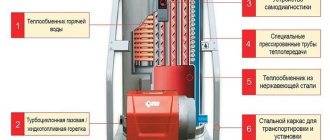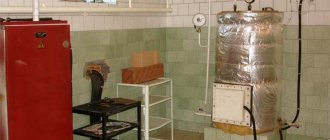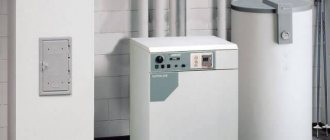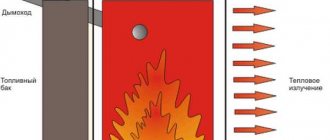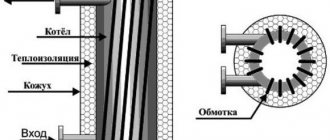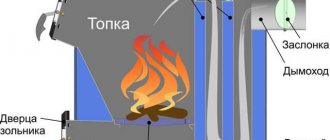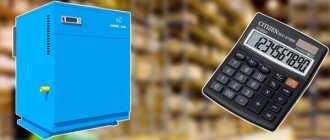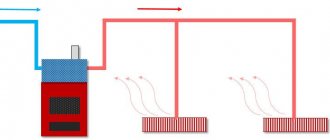Parameters for choosing a solid fuel boiler
Efficiency
Power is valuable as a parameter only in relation to efficiency, and in this case it fluctuates widely and depends on the type of unit and combustion material.
1. Traditional devices have an efficiency of about 80%,
2. pyrolysis – approximately 90%,
3. long burning – about 85%.
Type of fuel
The type of fuel is of great importance, and it can be very diverse:
1. Coal;
2. Pellets;
3. Briquettes;
4. Firewood;
5. Coke;
6. Peat.
When burning fuel, ash is formed, which needs to be cleaned: from coal - every day; from wood - weekly; from briquette - monthly.
Heat exchangers of products are:
1. Cast iron;
2. Steel;
3. Copper.
Purpose
The devices are:
1. Single-circuit - designed exclusively for a heating system with the ability to connect an indirect heating boiler;
2. Double-circuit - designed for heating and hot water supply.
Electricity dependence
Devices are also divided according to the criterion of dependence on electricity. Models that operate without electronics, are loaded manually, and circulate water without a pump are considered autonomous.
Fuel supply method
Fuel supply is:
1. Manual;
2. Automatic.
In the case of automatic fuel supply, a hopper is used from which only small materials are loaded: pellets and coal. Logs are thrown into the firebox only by hand.
Rating of the best gas boiler manufacturers
The reliability and stability of heating a private house or apartment depends on the operation of thermal equipment. Saving in its selection is impractical.
Among manufacturers producing boilers, the following brands are popular with consumers:
- Buderus is a company of German origin that produces reliable wall and floor models. There are devices with cast iron heat exchangers. The product line includes devices with open and closed burner.
- Navien is a Korean manufacturer with official representative offices in Russia, the USA and other countries. The products are famous for their unpretentiousness, low noise level, and reliability in operation. Navien boilers are distinguished by their low gas pressure requirements.
- Bosch - a company from Germany is famous for the reliability of its equipment. The manufacturer produces a full range of gas equipment for domestic use. The boilers are distinguished by increased operational safety and convenient control.
- Vaillant is a German brand popular in the gas equipment market. The company produces boilers with a closed and open combustion chamber with a power from 4 to 240 kW. The products are equipped with a reliable safety system, including protection against freezing, overheating and pump blocking. There is a wide network of service centers throughout Russia.
- Viessmann is a manufacturer that produces reliable heating and water heating equipment. The line of gas boilers includes single- and double-circuit models for floor and wall installation. The devices are environmentally friendly and have low noise levels. There is built-in protection against power surges. Many models can use both natural and liquefied gas as fuel.
- Ariston is an Italian brand, along with household appliances, offering gas equipment for heating and hot water supply. The boilers are famous for their high efficiency and low energy consumption. The devices are equipped with pump stop protection, flame modulation, and a semi-automatic ignition system. Thanks to the stylish design, the equipment looks good in the interior.
- Baxi is a company from Italy that produces water heating and heating equipment. The product line includes convection and condensing boilers of different capacities and designs. They are equipped with a good system for ensuring safe operation. There is a flame modulation mode that helps reduce fuel consumption. Built-in automation responds to changing weather conditions.
- Lemax is a Russian brand that produces reliable, inexpensive installations using components from foreign manufacturers. Models available for floor and wall installation. The devices are adapted for Russian conditions: they can be operated at low gas pressure, and the voltage range has been expanded. Composite materials are used in manufacturing. A wide network of service centers allows you to quickly resolve any problems that arise.
- ZhMZ - products of the Zhukovsky Machine-Building Plant are popular in the budget segment of the market. The devices have a full range of basic functions and are well adapted to work in Russian conditions. There is gas pressure control, non-volatile ignition, and overheating protection. German-made automation is used. The devices are designed to operate on natural and liquefied gas.
- Neva is a Russian company from St. Petersburg that produces heating equipment of several modifications. Boilers with one and two circuits are available. The copper heat exchanger is highly efficient and resistant to temperature changes. The safety system includes protection against freezing, overheating, and pump blocking. The auto-diagnosis function allows you to quickly identify malfunctions in the installation.
By choosing a boiler manufactured by one of the manufacturers listed above, you can be sure of its long-term reliable operation.
Types of water heating devices
All modern heating boilers used in private houses and apartments are divided into groups according to the following criteria:
- consumed energy carrier – natural gas, electricity, solid fuel, etc.;
- by installation method - floor and wall;
- in terms of functionality - single-circuit and double-circuit, the latter additionally heats water for hot water supply;
- need for electrical connection - dependent and non-volatile.
We propose to consider boiler installations, dividing them according to the main criterion - the energy carriers used. Existing types of devices:
- gas;
- solid fuel;
- electrical;
- diesel;
- combined, otherwise multi-fuel.
Now we will analyze each group separately, covering in detail all the disadvantages and advantages of boilers.
Electric boilers for heating a private house
Electric heating boilers are designed to heat houses not connected to gas mains. They cannot boast of being economical, but in some cases they are the only available option for organizing heating - not everyone is ready to carry around firewood and coal, or endure the subtle smell of diesel fuel throughout the house. As for electrical equipment, it is environmentally friendly and unpretentious.
Electric boilers are divided into heating elements, electrode and induction. They differ in the principle of heating the coolant and are characterized by high efficiency. The lack of gasification and the inability to install other types of boilers makes electric boilers ideal equipment for heating private homes. Let's look at the features of certain varieties.
Tenovye
Electric heating element boilers are a timeless classic. The most common heating elements are installed inside them, heating the coolant. Next, the heat enters the pipes and is transferred through radiators to the rooms. These devices have minimal dimensions and are excellent for heating private homes. Power is supplied from single-phase and three-phase networks - depending on the power of the equipment. Heating element boilers boast high efficiency and ease of installation. They are controlled by external or built-in automation modules.
Classic heating element boilers have a couple of disadvantages. The first of them is the low reliability of heating elements. They often fail and even cause fires. They are also characterized by high inertia - their own heating and subsequent heating of the coolant takes time (due to this, part of the electricity is wasted). However, cheapness and simplicity are the factors that ensured the popularity of heating element boilers.
If you want to purchase reliable, unpretentious equipment that does not require frequent maintenance, turn your attention to heating element electric boilers.
Electrode
Heating private houses using electrode boilers allows for some efficiency - its figure is 10-20%. It is achieved due to the design features of the electrode equipment and the automation systems used. These devices have an extremely simple design - two electrodes are installed inside, to which alternating current is supplied. This ensures direct heating of the coolant. Here is a list of the advantages of electrode boilers:
- Fast heating of the coolant;
- More intense circulation;
- Possibility of using salt additives to increase the efficiency and efficiency of equipment;
- Compactness;
- Almost complete fire safety.
In the list of disadvantages, we can include demands on the quality of the coolant - if its electrical conductivity changes, the efficiency of the heating system may drop.
Electrode boilers are suitable for those who are pursuing efficiency and are willing to put up with some of the disadvantages inherent in electrode (ion, ion exchange) models. Fire safety is ensured by natural cessation of operation in the absence of coolant.
Induction
Induction heating boilers, which have many advantages, are not particularly widespread. They are large in size and require stable supply voltage. But scale does not form in them (as in heating element models), and they do not require a balanced coolant (like induction models). Heating of the coolant here is carried out due to electromagnetic induction created by powerful coils and special electronic equipment.
Such heating can be called direct, since the coolant is heated directly in the metal pipe, which is the core of the coil. The prices for induction boilers for heating a private home are steep, so they cannot be called an ideal solution for home use.
Rating of the best solid fuel heating boilers of 2021
Classic solid fuel heating boilers are unpretentious in maintenance, do not depend on external power sources and are capable of reliably heating rooms. Excellent for heating residential buildings, as well as for heating industrial premises, country houses for seasonal residence, and summer cottages.
1
Teplodar Kupper OK 15
One of the best and most famous combined gas-electric boilers for heating a private home. The model is known for its simplicity and reliability at a low price. It is also distinguished by its successful inclined design of the firebox and its ease of cleaning. The power of the heating element block is 6 kW. The owners also note the stylish modern design and excellent build quality for a domestic manufacturer.
Despite the fact that the model is quite successful and in demand, there are also many disadvantages: a small loading hole and the firebox itself (wood up to 35 cm), a steel heat exchanger that is susceptible to corrosion, relatively low efficiency, and high soot formation.
Type of fuel used
A gas boiler
Gas-powered units are now the most popular, since in most cases they provide the most favorable heat. If, of course, you can connect to public networks. A very significant factor is the convenience of blue fuel, its purity and waste-free nature. Such equipment operates without human intervention around the clock.
Boiler room with gas heat generator
When there is no mains nearby, gas heat generators can be connected to cylinders or gas holders and get the same consumer benefits. It is enough just to replace the burner or reconfigure the existing one. True, the pleasure will not be so cheap, because the cost of liquefied propane-butane will be about 5 times higher.
A separate topic is condensing boilers. They are designed in such a way that they use the full potential of the fuel, collecting heat also from heated water vapor, which usually flies away along with the smoke. There is no need to be surprised at the seemingly fantastic efficiency exceeding the one hundred percent threshold. When the methodology for its calculation was developed, this technology still seemed unrealistic. The cost of condensing boilers is quite high, but against the backdrop of rising gas prices, the investment is justified. Stable fuel economy will be 10 percent or more.
Solid fuel heating devices
In those regions where specific raw materials are not in short supply, heating a house with a solid fuel boiler can compete with main gas in its economic indicators. At least they are guaranteed second place.
Solid fuels are:
- firewood,
- coal,
- coke,
- peat,
- briquettes,
- pellets.
Yes, this is not entirely clean. Yes, you will have to frequently load fuel and remove ash. But there are also wood-fired pyrolysis boilers, which can operate all night on one bed, or pellet units, whose battery life depends only on the capacity of the bunker.
Pellets are very convenient, but not always cheap
Electric heat generator
This is also a fairly common solution. Primarily due to the fact that such boilers can be quite easily installed and even easier to operate. For example, there is no need to deal with the problem of smoke removal (in the absence of one), or to ensure air flow to the device. Electric boilers for heating a private home are silent and compact, there is no dust or odors from them. Moreover, better controllability is available to the consumer.
Both heating elements and electrode models have a fairly high efficiency, but efficiency is still not their strong point. Electric heating is about 10 times more expensive than main gas heating; it definitely holds the anti-record. It seems that energy is always available - here is an outlet, plug in, but the traditional problem is the lack of free power to power a unit designed for several kilowatts. And don't forget about power outages.
This is under the casing of the heating element boiler
Liquid fuel equipment
Such heat generators mainly burn diesel fuel, although there are boilers that run on kerosene, oil, fuel oil, and waste oils. Mixtures of diesel fuel with gas or diesel fuel with oil are also used. Most liquid fuel boilers have a “standard” design; if you replace the burner, they can operate on gas, mains or liquefied. Although all of them are more economical than electric ones, heat will cost several times more than heating a house using mains gas. Obvious disadvantages include the mandatory use of a fuel storage container, as well as the need for strict control of the quality and temperature of the fuel. The issues of noise and unpleasant oil smell, at least for modern units, are controversial.
Universal multi-fuel boilers
The ability to switch to different types of energy allows us to feel more confident, especially if we need to heat a country house. As a rule, the same firebox is used for this, only it is necessary to perform certain manipulations with the burner:
- It is completely removed if you need to use firewood (in pellet boilers).
- They install other nozzles when connecting a gas boiler from cylinders.
- They change the burner to switch from gas to diesel.
- Install a “mounted” burner for burning gas or diesel fuel in the chamber of a solid fuel boiler.
Some models use several separate combustion chambers designed for different types of fuel. Many solid fuel boilers are equipped with heating elements that allow you to maintain the temperature set by the coolant, or protect the system from defrosting when no one is in the house.
Using a combi boiler
Heating boilers
A heating boiler is a device in the form of a closed container, inside which the liquid (coolant) is heated by transferring thermal energy from the combustion of any fuel or heating of electrical elements.
The coolant is heated to a predetermined temperature and, circulating through the heating system (pipes, radiators, heated floors), provides heating for residential, office, administrative, industrial and other premises and buildings.
The choice of boiler for heating determines the consumer’s confidence in guaranteed uninterrupted heat production over a long period of time, as well as the level of costs for its operation and the necessary maintenance. Therefore, we would like to describe for you a number of nuances of this important equipment.
Heating boilers are divided according to several main criteria:
- Type of fuel used
- Power
- Installation method
- Possibility of preparing hot water (DHW)
Type of fuel
Selecting a heating boiler usually begins with determining the available types of fuel and selecting the main one for use.
The fuel can be the following: main or liquefied gas (propane), diesel fuel, electricity, solid fuel (wood, coal, pellets), fuel oil or waste oil. The consumer, as a rule, chooses the most budget-friendly and guaranteed fuel option.
At the moment, the most accessible and inexpensive gas in the Russian Federation is gas from main pipelines. In the absence of gasification, the choice most often arises between electricity, diesel fuel and liquefied gas. From the point of view of existing prices for these types of fuel and their consumption by boilers, these options seem similar. However, very often the choice is made in favor of electric heating boilers due to the lack of costs for the purchase and installation of associated equipment: a diesel tank or gas holder (propane tank), fuel supply pipelines. Electric boilers do not require a chimney, are quickly put into operation and do not require startup by a highly qualified specialist, as is the case with gas boilers. However, they also have their own characteristics, incl. for additional accessories that affect energy consumption. Solid fuel boilers (wood, coal) are also in demand among heat consumers. Long-burning solid fuel pyrolysis and pellet boilers are becoming increasingly popular. Despite the increased cost of such equipment, the consumer benefits from the economical consumption of solid fuel. Fuel oil and waste oil are usually used in cases where they have unlimited access, for example, in oil refining plants (fuel oil) or in car service centers (waste oil). Experience with the use of waste oil shows the need for frequent reconfiguration of burner devices on boilers, which is caused by changes in the composition of this fuel.
Calculating power
After choosing the main type of fuel, it is important to calculate the boiler power in kilowatts. It is determined by the heat losses of the room, as well as additional factors affecting the output of the boiler. In particular, the parameters of an indirect heating boiler, which can be selected to work in conjunction with the boiler. To accurately determine heat loss, “thermal calculation” is used. It is carried out by a specialist designer based on the floor plan and its parameters, allowing you to correctly select the boiler and heating radiators, calculate the size and location of pipes, fittings and shut-off valves. This is a paid service. To approximately calculate the boiler power without thermal calculation, parameters such as heated area, ceiling height, degree of insulation and glazing of the room are taken into account. So, with average winter temperatures outside the window not lower than minus 15oC, with an area of 200 m2 and a ceiling height of no more than 3.0 m, good insulation and glazing, heat losses can be considered within 20 kW, i.e. 1 kW per 10 m2. In this case, the boiler is selected with a power reserve of 10-15%, which ultimately amounts to about 23 kW. This is the desired rated power of the boiler, which is selected for the above parameters.
We recommend watching
Video provided by user INBUD from youtube.com
Location options
According to the type of location, heating boilers are divided into wall-mounted and floor-mounted. Wall-mounted models are compact in size and are often equipped with a pump, expansion tank and safety group. Convenient location, relatively light weight, readiness for full-time work are undoubted advantages and the main criteria for choosing a wall-mounted heating boiler. Moreover, due to the compact arrangement of the internal equipment and the features of the heat exchangers, the service life of wall-mounted boilers from various manufacturers on average does not exceed 10 years on average. The power of the “wall-mounted” units is also limited depending on the type of fuel used. Among all wall-mounted boilers, gas ones are most often used, and electric ones are used less often. Floor-standing boiler models have impressive weight and dimensions, requiring considerable space for installation and maintenance. At the same time, they have a number of advantages compared to wall-mounted ones: increased service life due to the use of large cast iron or steel heat exchangers and the peculiarities of the equipment location; higher power range, ease of maintenance.
Depending on the possibility of preparing hot water, heating boilers are divided into single-circuit and double-circuit. Single-circuit boilers are designed for heating and do not include elements for heating water. At the same time, as a rule, they have the ability to connect indirectly heated water heaters (boilers). Double-circuit boilers heat the heating medium and prepare hot water. The type of DHW preparation in double-circuit boilers can be either flow-through in a high-speed heat exchanger or storage in a built-in boiler. The choice of a boiler for the possibility of preparing domestic hot water is usually based on several criteria: the presence/absence of a water heater; maximum demand for hot water depending on the number of taps, washbasins, showers, etc. and the number of people living. When using several distribution points simultaneously for comfortable preparation of hot water, it is recommended to use single-circuit heating boilers in conjunction with indirect heating boilers or double-circuit boilers with a built-in boiler of the required volume.
We will provide support
Do you think which boiler is best for heating a private home? Are you planning to purchase certified boiler equipment with high efficiency levels? Or maybe you are interested in the best possible price? Type of fuel, autonomy, ease of use, reliability and low price - these are the main issues that customers discuss with us. We will answer all of them and offer you the best!
Advantages and disadvantages of electric boilers
Electrical equipment used to heat the coolant of autonomous heating systems has a number of advantages.
- Unlike gas and solid fuel units, electric ones do not use an open fire source during operating heating mode. The design of electrical equipment provides for heating the coolant through the influence of physical processes by special boiler elements caused by the influence of electric current.
- The absence of burners and flames allows electric boilers to be fireproof if the electrical wiring is installed correctly. For the same reason, there are no harmful emissions into the atmosphere, unlike their “brothers” that use fossil resources.
- When connecting a gas main used for heating, it is necessary to comply with a whole list of technical conditions that will be presented by the gas workers servicing the territory of the household. At the same time, the low price of gas for years to come will be reflected several times in the cost of design documentation and pipe laying. And the availability of electricity does not require any approvals.
- For solid fuel and sometimes gas boilers, a special boiler room is required, equipped with all the necessary attributes of fire safety and technological equipment. The compactness of electrical units allows heating devices to fit into the interior of any living room.
- The design of electrical equipment is quite simple to control and operate. The operating mode of heating the coolant does not require control. Using simple power buttons, set the desired parameters. Further participation of the consumer in the operation of the boiler occurs if it is necessary to adjust the set parameters.
- Low price and no need for storage facilities for solid or liquid fuel are also advantages of electric boilers.
Installing electrical equipment also has disadvantages:
- The high cost of electricity and the lack of technical ability to heat large cottages.
- The use of electric boilers is effective in closed circuits of heating systems, and this will entail alteration and increase in cost of existing intra-house lines. The operation of electrical equipment with natural circulation or an open expansion tank leads to a decrease in thermal power, and therefore the relevance of the application.
In addition, installation of an electrical unit often involves the installation of additional elements:
- circulation pump to create a closed circuit;
- voltage stabilizer with high sensitivity to changes;
- replacing the coolant with a chemically neutral one, with a certain resistivity, for electrode boilers;
- replacing radiators, because hydrogen sulfide can form in the water, which destroys aluminum.
The best long-burning solid fuel boilers
Stropuva Mini S8 8 kW
Bright solid fuel boiler with a safety valve, power 8 kW. Suitable for heating a room of 80 m2. The fuel burns for up to twenty hours, the temperature is enough for the whole night.
Characteristics:
- type of device - solid fuel boiler;
- type of combustion - long;
- contours - single-circuit;
- power - 8 kW;
- area - 80 m2;
- placement - floor;
- energy independence - yes;
- control - mechanics;
- combustion chamber - open;
- fuel - firewood, wood briquettes;
- safety valve - yes;
- thermometer - yes;
- weight - 145 kg;
- price - 53,000 rubles.
Advantages:
- compactness;
- long burning;
- ease of use;
- reliable handles;
- does not require power supply;
- robust design.
Flaws:
- high price;
- heavy weight;
- it is difficult to wash off carbon deposits from the cladding;
- Not very convenient for loading firewood.
ZOTA Topol-22VK 22 kW
A high-quality solid fuel device with a power of 22 kW, which is enough to heat an area of 220 m2. Convenient loading consists of two sections for storing firewood.
Characteristics:
- appliance - solid fuel boiler;
- contours - single-circuit;
- power - 22 kW;
- placement - floor;
- control - without control panel;
- fuel - coal, coal briquettes, firewood, wood briquettes;
- thermometer - yes;
- weight - 128 kg;
- price - 36,860 rubles.
Advantages:
- various types of fuel;
- long burning;
- economical consumption;
- convenient operation;
- reliable design.
Flaws:
- heavy weight;
- no control panel.
ZOTA Topol-16VK 16 kW
A decent model of a solid fuel boiler with two sections for storing fuel. Designed for heating a small private house or workshop of 160 m2.
Ensures long burning of wood or coal.
Options:
- unit - heating boiler;
- fuel - coal, firewood, coal and wood briquettes;
- power - 16 kW;
- placement - floor;
- control - without control panel;
- Efficiency - 75%;
- thermometer - yes;
- weight - 108 kg;
- cost - 30,100 rubles.
Advantages:
- heats up quickly;
- gives uniform heat;
- quality materials;
- long burning;
- possibility of laying briquettes;
- easy control.
Flaws:
- high price;
- heavy weight;
- no control panel.
ZOTA Topol-32VK 32 kW
Reliable solid fuel unit with a power of up to 32 kW. Capable of heating an area of 320 square meters. It is possible to install an additional heating element and connect external control.
Excellent for a country house, ensures long burning of fuel.
Characteristics:
- type of device - solid fuel boiler;
- number of circuits - one;
- power - 32 kW;
- area - 320 m2;
- installation - floor;
- energy independence - yes;
- control - mechanics;
- Efficiency - 75%;
- fuel - coal, coal briquettes, wood briquettes, firewood;
- thermometer - yes;
- connection of external control - yes;
- weight - 143 kg;
- price - 40,370 rubles.
Advantages:
- fast heating;
- reliable assembly;
- simple controls;
- opportunity to purchase a burner;
- economical fuel consumption;
- stylish design.
Flaws:
- heavy weight;
- high price.
Stropuva S30 30 kW
A full-fledged solid fuel boiler with a power of 30 kW for heating a room of 300 m2. Equipped with thermometer and safety valve.
Made of high quality steel, the material does not become red-hot when the boiler heats up.
The only boiler that continues burning for up to 31 hours.
Characteristics:
- appliance - solid fuel boiler;
- power - 30 kW;
- area - 300 sq.m.;
- placement - floor;
- control - mechanical;
- contours - one;
- non-volatile - yes;
- combustion chamber - open;
- Efficiency - 85%;
- material - steel;
- fuel - firewood, wood briquettes;
- thermometer - yes;
- safety valve - yes;
- weight - 257;
- price - 89,800 rubles.
Advantages:
- long burning;
- uniform heat;
- fast heating;
- quality materials;
- presence of a thermometer;
- economical fuel consumption.
Flaws:
- high price;
- heavy weight;
- bulky.
Which heating boiler is better to choose?
Before purchasing a boiler, you should decide on the type of fuel that will be used, since the main part of the operating costs is its cost. If you have not yet decided which heating boiler to choose, check out their main characteristics.
A gas boiler. The cheapest and most common fuel is gas. The amount of heat generated during equipment operation exceeds similar indicators for other types of fuel. Gas is burned in the firebox with virtually no residue, which is also a big plus. Gas boilers are equipped with meters that can be used to control fuel consumption. The equipment is not subject to corrosion and has a long service life.
Boilers with modeling burners are modern devices equipped with burners that allow you to smoothly change the power of the device, leaving the efficiency value unchanged. The amount of fuel in the combustion chamber in such units changes due to changes in the amount of air and aerodynamic resistance. The fuel is completely burned in the chamber thanks to simulating liquid fuel burners with preheating. The burners are also called “blue flame burners”. The blue flame is obtained as a result of heating the fuel by the reverse gas flow.
When choosing a boiler for your home, do not forget that gas boilers cannot be used everywhere, since gas lines are not laid everywhere. In addition, in new settlements, gas pipelines are installed only some time after the start of construction.
Diesel boiler. The units do not depend on centrally laid pipelines, but at the same time they are expensive. In addition, it is necessary to equip a special place for storing diesel fuel reserves. For this purpose, a room is allocated inside the boiler room or special holes are dug outside the house.
During operation of a diesel boiler, the fuel evaporates and its vapors burn. The sulfur emissions formed during this process settle on the walls of the boiler. Therefore, diesel-powered units, as a rule, are made of cast iron, which produces much less condensate. The boilers are equipped with an automation system that saves energy.
Solid fuel boiler. Before choosing a boiler, keep in mind that a solid fuel unit requires a lot of effort and time. It is necessary to load fuel frequently, and since the combustion efficiency is low, the boiler efficiency is about 60%. After combustion, soot remains and the unit must be cleaned. In addition, solid fuel needs to be stored somewhere, and this is a fairly large area.
Electric boiler. The operating temperature can be easily controlled; in some models it is possible to switch the boiler to an economical operating mode. But the equipment has one important drawback - it is uneconomical. Another disadvantage of the unit is the inability to use it during power outages. This problem, however, can be easily solved by installing an emergency power supply in the house.
What characteristics exist
First of all, gas boilers differ from each other in their circuit design. It is possible to install a boiler with one or two circuits. In this case, the main circuit provides temperature control in the building, and the second circuit maintains hot water supply (DHW). Accordingly, if the house has a boiler for heating water using other energy sources, then the need for a second circuit remains at the discretion of the buyer, because this will allow saving on water heating during the heating season.
It is also worth considering such characteristics as the type of chimney for exhaust gas removal and the installation method (wall-mounted or floor-mounted), since these parameters depend on the need to place the boiler in a separate room, observing fire safety rules. Another problem is that most of the heat is removed through the chimney into the atmosphere along with the spent fuel. This is inevitable, but efficiency can be increased by installing a coaxial chimney and a boiler with a closed combustion chamber.
The main defining characteristic of a boiler is its heating power, measured in Watts. The larger the area of the building that needs to be heated, the more power will be required. It is worth considering that over time, the efficiency of the boiler decreases if its maintenance is neglected - cleaning the combustion chamber and heat exchangers will get rid of carbon deposits and condensate, thereby increasing the quality of heating.
In addition, it is worth considering the many additional features provided by the manufacturers of such heating systems. Temperature control using a remote control or even a smartphone program, protection against temperature changes or automated indoor climate control - this is not a complete list of functions of modern boilers that may be of interest to the buyer.
Selecting heat generator power
The performance of the heating device must correspond to the heat loss of a particular house on the coldest days of winter. Ideally, it is necessary to make thermal calculations. A simpler way is to choose a boiler such that for every 10 square meters of the building there is 1 kW of power. It should be noted that this formula is suitable for cottages that are well insulated. A reserve of 15-20 percent will not hurt, but heat generators that are too powerful, operating in a clamped mode most of the time, will produce an efficiency below the nominal one and consume excess fuel.
This table will help you navigate the performance of heat generators
Pair of gas boilers installed in cascade
Which boiler to choose for heating a private house
1. Boiler for a city house
In private homes, any of the boilers discussed above are installed, but the specific choice is made based on the circumstances.
For large facilities located within the city, the most rational option would be to connect a floor-standing single-circuit boiler to the gas pipeline and additionally arrange hot water supply using an indirect heating boiler.
In smaller private dwellings, you can install the same unit, but a double-circuit wall-mounted one with a closed firebox. In addition, it is better to choose a cast iron heat exchanger. If the water is soft, then use a steel bithermal one. When comfort plays a role, and money does not matter, you can choose an electric device.
2. Boiler for a country house
In the case of a house located outside the city, the options are the same, but if it is possible to connect to the highway. Otherwise, a good alternative is a solid fuel boiler, the fuel for which is selected based on the prices of coal, coke, firewood, pellets, briquettes in a particular region.
So how do you choose a boiler for heating a private house?
To make it easier to navigate when choosing, let's systematize the information. Let's look at the most typical requirements that influence the choice of boiler type:
- The most economical heating. The cheapest heating options are wood/coal and gas. Next come pellets, liquid fuel and electricity. In general this is true, but the situation greatly depends on the region. In some places electricity will be cheaper, in others liquid fuel will be cheaper. In general, you have to count.
- Degree of autonomy. The most automated are gas, electric and pellet units. They can be left at work unattended. Liquid fuel ones require a little attention. The least automated are solid fuel ones. To keep your home warm, you need to choose the right boiler for heating a private home.
- Difficulty connecting. The most difficult thing is with the registration and connection of gas. There may be problems with allocating power for electric heating - not all substations have a reserve. With the rest, everything is simple: the main thing is to follow the recommendations for safe installation.
If you take into account the availability and affordability of fuel, making your choice is not difficult.
Types of boilers
Before choosing a boiler for heating a private home, it is important to understand that the main factor that will influence the final choice will be the type of fuel. That is why boilers are divided primarily on this basis.
- Solid fuel. Boiler burning coal, briquettes, wood, pellets.
- Liquid fuel. Boiler running on diesel fuel (diesel fuel).
- Electric. A boiler powered by electricity.
- Gas. Boiler running on natural or liquefied gas.
Combined systems are also available for sale. For example, a gas design is combined with an electric one. Why is this combination necessary? The fact is that it is beneficial when electricity is calculated at day and night rates. For example, during the day you will heat the rooms of your house with gas, and at night with electricity. In addition, such a system is convenient to use in a country house, where you will appear from time to time. Thus, in winter, the electric section of the combination boiler will maintain the coolant at a given temperature so that it does not freeze, and when you arrive at the house, it is possible to connect the gas part of the combination boiler to the temperature you require.
